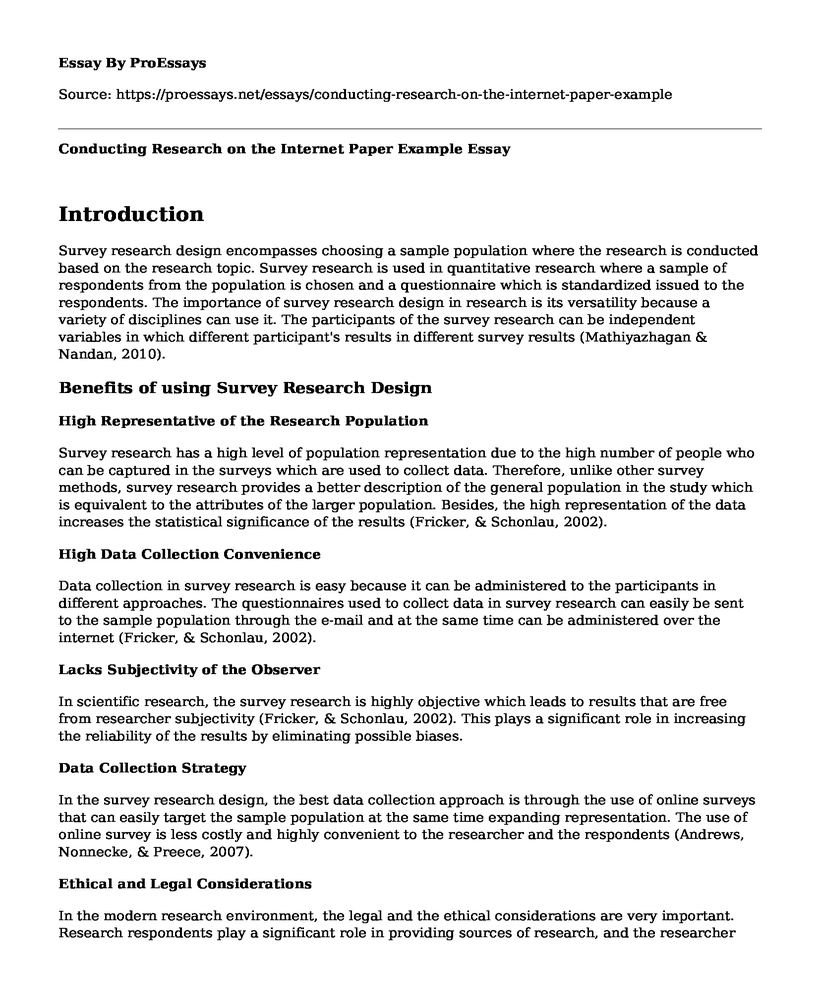Introduction
Survey research design encompasses choosing a sample population where the research is conducted based on the research topic. Survey research is used in quantitative research where a sample of respondents from the population is chosen and a questionnaire which is standardized issued to the respondents. The importance of survey research design in research is its versatility because a variety of disciplines can use it. The participants of the survey research can be independent variables in which different participant's results in different survey results (Mathiyazhagan & Nandan, 2010).
Benefits of using Survey Research Design
High Representative of the Research Population
Survey research has a high level of population representation due to the high number of people who can be captured in the surveys which are used to collect data. Therefore, unlike other survey methods, survey research provides a better description of the general population in the study which is equivalent to the attributes of the larger population. Besides, the high representation of the data increases the statistical significance of the results (Fricker, & Schonlau, 2002).
High Data Collection Convenience
Data collection in survey research is easy because it can be administered to the participants in different approaches. The questionnaires used to collect data in survey research can easily be sent to the sample population through the e-mail and at the same time can be administered over the internet (Fricker, & Schonlau, 2002).
Lacks Subjectivity of the Observer
In scientific research, the survey research is highly objective which leads to results that are free from researcher subjectivity (Fricker, & Schonlau, 2002). This plays a significant role in increasing the reliability of the results by eliminating possible biases.
Data Collection Strategy
In the survey research design, the best data collection approach is through the use of online surveys that can easily target the sample population at the same time expanding representation. The use of online survey is less costly and highly convenient to the researcher and the respondents (Andrews, Nonnecke, & Preece, 2007).
Ethical and Legal Considerations
In the modern research environment, the legal and the ethical considerations are very important. Research respondents play a significant role in providing sources of research, and the researcher has an ethical responsibility of ensuring that the life, dignity, integrity, privacy, self-determinism, and confidentiality of the respondents. Mistreatment of the respondents is considered as research misconduct. It is important for the researchers to seek the consent of the respondents and to ensure that they do not violate the privacy of the respondents which could lead to legal action against the researcher (Yip, Han, & Sng, 2016).
References
Andrews, D., Nonnecke, B., & Preece, J. (2007). Conducting research on the internet:: Online survey design, development, and implementation guidelines.
Fricker, R. D., & Schonlau, M. (2002). Advantages and disadvantages of Internet research surveys: Evidence from the literature. Field methods, 14(4), 347-367.
Mathiyazhagan, T., & Nandan, D. (2010). Survey research method. Media Mimansa, 4(1), 34-45.
Yip, C., Han, N. L. R., & Sng, B. L. (2016). Legal and ethical issues in research. Indian journal of anaesthesia, 60(9), 684.
Cite this page
Conducting Research on the Internet Paper Example. (2022, Oct 08). Retrieved from https://proessays.net/essays/conducting-research-on-the-internet-paper-example
If you are the original author of this essay and no longer wish to have it published on the ProEssays website, please click below to request its removal:
- Child Welfare and Information and Communication Technology
- How Did the Hackers Steal Target's Customer Data? Paper Example
- Data Storage and Processing in the 21st Century: A Guide - Research Paper
- Essay Example on Software Piracy: Preventive and Deterrent Solutions
- APT5: Chinese-Sponsored Hackers Targeting Global Organizations - Essay Sample
- Interpreting Data: Stat Meth, Market Strategies & Business Decisions - Report Sample
- Free Essay Sample on Nike: Maximizing Athletes' Potential & Shareholder Value







